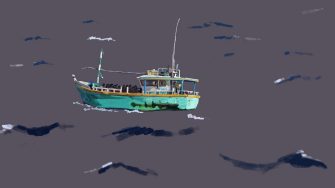Offshore processing in the UK
Kaldor Centre researchers work with government, civil society, academics and other stakeholders to challenge the adoption of Australian-style 'offshore processing' in the UK
Kaldor Centre researchers work with government, civil society, academics and other stakeholders to challenge the adoption of Australian-style 'offshore processing' in the UK

In 2024, the UK passed the Safety of Rwanda (Asylum and Immigration) Act 2024, requiring decision-makers in the UK to treat Rwanda as a ‘safe country’ to which asylum seekers can be removed in all but very limited circumstances. While this law was being debated in parliament, Kaldor Centre researchers provided expert commentary on the risks of the UK’s plans and the lessons it could learn from Australia.
In the UK Constitutional Law Association Blog, Kaldor Centre Senior Research Fellow Madeline Gleeson and Professor Theodore Konstadinides of the University of Essex sought to settle the debate about whether Australia’s offshore processing policies are comparable to the UK’s proposed Rwanda plan. They drew from the Australian experience to argue that the Rwanda plan was unlikely to achieve its stated policy objectives; risked creating a serious humanitarian crisis and violating international law; might expose the UK government to financial, legal and reputational liabilities; and carried domestic political risks.
In Australian Outlook, Madeline Gleeson detailed how the influence of Australia’s deterrence-based asylum policies was spreading across Europe and the UK, with serious consequences for both human rights and the rule of law.
In The Conversation, Kaldor Centre affiliate Dr Natalie Hodgson published a series of articles explaining the delays to the UK’s Rwanda plan while the Safety of Rwanda Bill was being debated by parliament and the obstacles that could still prevent flights to Rwanda after it was passed.
Dr Hodgson also provided evidence to the Public Accounts Committee inquiry on Asylum Accommodation and the UK-Rwanda Partnership. The evidence highlighted difficulties in accurately estimating the cost of offshore processing and identified a number of areas where costs could exceed budgeted expectations.
Throughout 2023, Kaldor Centre researchers provided commentary on the legal challenge to the Rwanda plan as it worked its way through the UK courts. In June, Kaldor Centre affiliate Dr Natalie Hodgson published an explainer on the Court of Appeal’s ruling that the UK could not send asylum seekers to Rwanda. Natalie also recorded a podcast with Senior Research Fellow Madeline Gleeson, explaining the context of the judgment and the Court’s key findings.
Dr Hodgson also provided written evidence to the UK Parliament’s Joint Committee on Human Rights on the Human Rights of Asylum Seekers in the UK and during the legislative scrutiny of the Illegal Migration Bill. This evidence discussed the legal standards that protect people seeking asylum and expressed concerns about the impact of offshore processing on the human rights of people seeking asylum.
In The Saturday Paper and podcasts for ABC News Radio and 7am, Madeline Gleeson explained how the UK was trying to replicate Australian-style policies and the legal and other dangers of such a route. Her work was also picked up in media coverage by UK Daily News and Financial Accountant.
In November 2023, the UK Supreme Court upheld the Court of Appeal’s findings that Rwanda was not a ‘safe country’ to which asylum seekers could be removed.
In September 2022, Madeline Gleeson and Dr Natalie Hodgson convened a high-level expert knowledge exchange to provide insights to UK stakeholders about the Australian experience of offshore processing. The event, entitled ‘Offshore Processing and Asylum Policy – Lessons from Australia’, included briefings from Amnesty International, the Australian Human Rights Commission, Médecins Sans Frontières and Dr Natalie Hodgson about the humanitarian, medical, legal and policy risks associated with offshore processing and strategies to advocate for asylum policies which do not violate international law.
As the UK pressed forward with its efforts to implement offshore processing, Madeline Gleeson engaged with various media outlets – including Channel 4 News UK, Agence France Press, The New European and VOA News – to highlight legal and other concerns with the policy.
In August 2021, as the UK parliament debated new legislation which would enable it to establish Australian-style ‘offshore processing’ arrangements, Madeline Gleeson and Kaldor Centre PhD candidate Natasha Yacoub published a timely policy brief entitled Cruel, Costly and Ineffective: the Failure of Offshore Processing in Australia. This policy brief was repeatedly cited by the Public Bill Committee of the UK House of Commons during its consideration of the Nationality and Borders Bill 2021.
In October 2021, the Kaldor Centre followed up its policy brief by providing a detailed submission to the Public Bill Committee expressing concerns that the Honourable George Brandis QC, High Commissioner for Australia to the United Kingdom, had made errors and misrepresentations about Australian asylum policy in his evidence to the Committee.
Kaldor Centre affiliate Dr Natalie Hodgson provided a submission to the Committee emphasising the human, financial and reputational costs of offshore processing.
In September 2020, media reports claimed that the UK Home Secretary Priti Patel was considering the possibility of adopting an Australian-style model of 'offshore processing' of asylum seekers. In November, Kaldor Centre Senior Research Fellow Madeline Gleeson and affiliate Professor Natalie Klein appeared before the UK House of Commons Home Affairs Committee to give evidence on this and related matters to the Committee’s inquiry into Channel crossings, migration and asylum-seeking routes through the EU. Their intervention prompted the Scottish National Party to demand absolute assurances that the UK government would never consider following the Australian model. Their evidence was also cited in subsequent submissions to UK parliamentary committees.
Following her appearance, on the request of the Home Affairs Committee, Senior Research Fellow Madeline Gleeson provided two written submissions to the Committee:
Read the Kaldor Centre's coverage of Madeline Gleeson and Professor Natalie Klein's appearance.